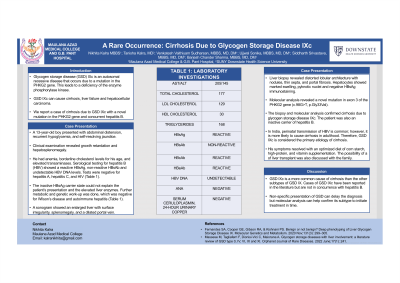Monday Poster Session
Category: Liver
P2604 - A Rare Occurrence: Cirrhosis Due to Glycogen Storage Disease IXc
Monday, October 23, 2023
10:30 AM - 4:15 PM PT
Location: Exhibit Hall

Has Audio

Nikhita Kalra
Maulana Azad Medical College
New Delhi, Delhi, India
Presenting Author(s)
Nikhita Kalra, 1, Tanisha Kalra, MD2, Venkatesh Vaithiyam Sudharsan, MBBS, MD, DM3, Ujjwal Sonika, MBBS, MD, DM3, Siddharth Srivastava, MBBS, MD, DM3, Barjesh Chander Sharma, MBBS, MD, DM3
1Maulana Azad Medical College, New Delhi, Delhi, India; 2SUNY Downstate Health Sciences University/NYCHHC Kings County Hospital, New York, NY; 3GB Pant Institute of Postgraduate Medical Education and Research, New Delhi, Delhi, India
Introduction: Glycogen storage disease (GSD) is a rare disorder characterized by an inability to metabolize glycogen. GSD IXc is an autosomal recessive disease that affects the PHKG2 gene leading to a deficiency of the enzyme phosphorylase kinase. Here, we describe a unique case of cirrhosis due to GSD IXc with a novel mutation in the PHKG2 gene (c.98G >T, p.Gly33Val).
Case Description/Methods: A 13-year-old boy presented with abdominal distention, recurrent hypoglycemia, and self-resolving jaundice. Clinical examination revealed growth retardation and hepatosplenomegaly. Blood work revealed anemia, thrombocytopenia, elevated aspartate and alanine transaminase levels, and raised plasma cholesterol and triglycerides. Ultrasound showed an enlarged liver with surface irregularity, splenomegaly, and a dilated portal vein. Etiological work-up for cirrhosis was positive for hepatitis B (HBV) surface antigen (HBsAg) and antibodies for HBV core and envelope antigens (anti HBc and anti HBe) but an undetectable HBV DNA level. HBV was considered to be an unlikely cause of cirrhosis due to the young age of the patient, hence further metabolic and genetic work-up was done. Tests for Wilson’s and autoimmune liver disease were negative. A liver biopsy revealed a distorted lobular architecture with nodules, thin septae, and portal fibrosis. Hepatocytes showed marked swelling and pyknotic nuclei, and negative HBsAg immunostaining. Molecular analysis revealed a novel mutation in exon 3 of the PHKG2 gene (c.98G >T, p.Gly33Val). The patient was diagnosed with cirrhosis due to GSD IXc and inactive chronic hepatitis B. His symptoms resolved with an optimized diet of corn starch, high-protein, and vitamin supplementation. The importance of liver transplantation was also discussed with the family.
Discussion: GSD presents with developmental delay, hepatomegaly, hypoglycemia, ketosis, and hyperlipidemia. GSD IXc is a more common cause of cirrhosis than the other subtypes of GSD IX. Cases of GSD IXc have been reported in the literature but not in concurrence with HBV. In India, perinatal transmission of HBV is common; however, it is more likely to cause cirrhosis in adulthood. Hence, GSD IXc is considered the main etiology of cirrhosis here. This PHKG2 mutation variant has not been identified before. This case highlights that the diagnosis can often be challenging due to the non-specific presentation, but molecular analysis can help in confirming the subtype of GSD and in the timely initiation of treatment.
Disclosures:
Nikhita Kalra, 1, Tanisha Kalra, MD2, Venkatesh Vaithiyam Sudharsan, MBBS, MD, DM3, Ujjwal Sonika, MBBS, MD, DM3, Siddharth Srivastava, MBBS, MD, DM3, Barjesh Chander Sharma, MBBS, MD, DM3. P2604 - A Rare Occurrence: Cirrhosis Due to Glycogen Storage Disease IXc, ACG 2023 Annual Scientific Meeting Abstracts. Vancouver, BC, Canada: American College of Gastroenterology.
1Maulana Azad Medical College, New Delhi, Delhi, India; 2SUNY Downstate Health Sciences University/NYCHHC Kings County Hospital, New York, NY; 3GB Pant Institute of Postgraduate Medical Education and Research, New Delhi, Delhi, India
Introduction: Glycogen storage disease (GSD) is a rare disorder characterized by an inability to metabolize glycogen. GSD IXc is an autosomal recessive disease that affects the PHKG2 gene leading to a deficiency of the enzyme phosphorylase kinase. Here, we describe a unique case of cirrhosis due to GSD IXc with a novel mutation in the PHKG2 gene (c.98G >T, p.Gly33Val).
Case Description/Methods: A 13-year-old boy presented with abdominal distention, recurrent hypoglycemia, and self-resolving jaundice. Clinical examination revealed growth retardation and hepatosplenomegaly. Blood work revealed anemia, thrombocytopenia, elevated aspartate and alanine transaminase levels, and raised plasma cholesterol and triglycerides. Ultrasound showed an enlarged liver with surface irregularity, splenomegaly, and a dilated portal vein. Etiological work-up for cirrhosis was positive for hepatitis B (HBV) surface antigen (HBsAg) and antibodies for HBV core and envelope antigens (anti HBc and anti HBe) but an undetectable HBV DNA level. HBV was considered to be an unlikely cause of cirrhosis due to the young age of the patient, hence further metabolic and genetic work-up was done. Tests for Wilson’s and autoimmune liver disease were negative. A liver biopsy revealed a distorted lobular architecture with nodules, thin septae, and portal fibrosis. Hepatocytes showed marked swelling and pyknotic nuclei, and negative HBsAg immunostaining. Molecular analysis revealed a novel mutation in exon 3 of the PHKG2 gene (c.98G >T, p.Gly33Val). The patient was diagnosed with cirrhosis due to GSD IXc and inactive chronic hepatitis B. His symptoms resolved with an optimized diet of corn starch, high-protein, and vitamin supplementation. The importance of liver transplantation was also discussed with the family.
Discussion: GSD presents with developmental delay, hepatomegaly, hypoglycemia, ketosis, and hyperlipidemia. GSD IXc is a more common cause of cirrhosis than the other subtypes of GSD IX. Cases of GSD IXc have been reported in the literature but not in concurrence with HBV. In India, perinatal transmission of HBV is common; however, it is more likely to cause cirrhosis in adulthood. Hence, GSD IXc is considered the main etiology of cirrhosis here. This PHKG2 mutation variant has not been identified before. This case highlights that the diagnosis can often be challenging due to the non-specific presentation, but molecular analysis can help in confirming the subtype of GSD and in the timely initiation of treatment.
Disclosures:
Nikhita Kalra indicated no relevant financial relationships.
Tanisha Kalra indicated no relevant financial relationships.
Venkatesh Vaithiyam Sudharsan indicated no relevant financial relationships.
Ujjwal Sonika indicated no relevant financial relationships.
Siddharth Srivastava indicated no relevant financial relationships.
Barjesh Chander Sharma indicated no relevant financial relationships.
Nikhita Kalra, 1, Tanisha Kalra, MD2, Venkatesh Vaithiyam Sudharsan, MBBS, MD, DM3, Ujjwal Sonika, MBBS, MD, DM3, Siddharth Srivastava, MBBS, MD, DM3, Barjesh Chander Sharma, MBBS, MD, DM3. P2604 - A Rare Occurrence: Cirrhosis Due to Glycogen Storage Disease IXc, ACG 2023 Annual Scientific Meeting Abstracts. Vancouver, BC, Canada: American College of Gastroenterology.
